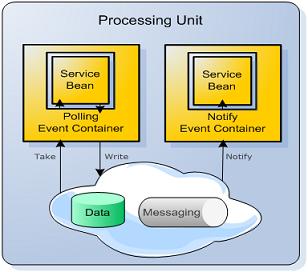Data Event Listener
OpenSpaces provides a single interface for Space Data event listeners used by different event containers (Space data event generators) such as Polling Event and Notify Event containers. The benefit of doing so is the loose coupling between how the events are received (the different containers) and what to do with a received event (the listener).

Space Data Event Listener
At their core, all different event containers should support raising event to an implementation of SpaceDataEventContainer. It is a simple interface described below:
public interface SpaceDataEventListener {
/**
* An event callback with the actual data object of the event.
*
* @param data
* The actual data object of the event
* @param gigaSpace
* A GigaSpace instance that can be used to perofrm additional operations against the
* space
* @param txStatus
* An optional transaction status allowing to rollback a transaction programatically
* @param source
* Optional additional data or the actual source event data object (where relevant)
*/
void onEvent(Object data, GigaSpace gigaSpace, TransactionStatus txStatus, Object source);
}
If we take the following simple implementation of the event listener interface:
public class SimpleListener implements SpaceDataEventListener {
public void onEvent(Object data, GigaSpace gigaSpace, TransactionStatus txStatus, Object source) {
// process event
}
}
Here is how it can be configured:
<bean id="simpleListener" class="SimpleListener" />
<os-events:x-container ...>
<!-- ... -->
<os-events:listener ref="simpleListener" />
</os-events>
<bean id="simpleListener" class="SimpleListener" />
<bean id="eventContainer" class="...">
<!-- ... -->
<property name="eventListener" ref="simpleListener" />
</bean>
POJO Event Listener Adapters
OpenSpaces comes with two built in event adapters, the first supporting annotations and the second supporting method listing. Here is a simple example of an event listener implementation using annotations:
public class SimpleListener {
@SpaceDataEvent
public void myEventHandler(Object data) {
// process event
}
}
The myEventHandler is marked using the SpaceDataEvent annotation as a callback that needs to be called in case of an event. Here is the XML configuration of the mentioned event listener:
<bean id="simpleListener" class="SimpleListener" />
<os-events:x-container ...>
<!-- ... -->
<os-events:listener>
<os-events:annotation-adapter>
<os-events:delegate ref="simpleListener"/>
</os-events:annotation-adapter>
</os-events:listener>
</os-events>
<bean id="simpleListener" class="SimpleListener" />
<bean id="eventContainer" class="...">
<!-- ... -->
<property name="eventListener">
<bean class="org.openspaces.events.adapter.AnnotationEventListenerAdapter">
<property name="delegate" ref="simpleListener" />
</bean>
</property>
</bean>
If we do not wish to use annotations, we can use the method adapter where method listing is used to define which methods are to be invoked. We can reuse the same SimpleListener (simply without the annotation) and configure it in the following manner:
<bean id="simpleListener" class="SimpleListener" />
<os-events:x-container ...>
<!-- ... -->
<os-events:listener>
<os-events:method-adapter method-name="myEventHandler">
<os-events:delegate ref="simpleListener"/>
</os-events:method-adapter>
</os-events:listener>
</os-events>
<bean id="simpleListener" class="SimpleListener" />
<bean id="eventContainer" class="...">
<!-- ... -->
<property name="eventListener">
<bean class="org.openspaces.events.adapter.MethodEventListenerAdapter">
<property name="methodName" value="myEventHandler" />
<property name="delegate" ref="simpleListener" />
</bean>
</property>
</bean>
Adapter Method Parameter’s
The adapter method callback can accept zero or more parameters following the same order and types of the SpaceDataEventListener. Since the different adapters use reflection to invoke the event method, specific types can be used as the data event (based on the template provided to the event container). For example, if we define a template that matches Trade objects, our listener can use it directly:
public class SimpleListener {
@SpaceDataEvent
public void myEventHandler(Trade trade, GigaSpace gigaSpace) {
// process event
}
}
Adapter Method Return Value
The adapter method callback can have a return value which will automatically be written back to the Space. The return value can either be a single object (which will cause write to be called) or an array of objects (which will cause writeMultiple to be called).
By default, an update-or-write operation will be performed. This flag can be set to false which will force a write operation to be performed. Update timeout and write lease can also be configured.
Here is an example of an event listener that returns an array of Order as a result of a Trade:
public class SimpleListener {
@SpaceDataEvent
public Order[] processTrade(Trade trade, GigaSpace gigaSpace) {
// process event
}
}
and the following is the configuration of such a listener using the annotation adapter:
<bean id="simpleListener" class="SimpleListener" />
<os-events:x-container ...>
<!-- ... -->
<os-events:listener>
<os-events:annotation-adapter update-or-write="false" update-timeout="1000" write-lease="1000">
<os-events:delegate ref="simpleListener"/>
</os-events:annotation-adapter>
</os-events:listener>
</os-events>
<bean id="simpleListener" class="SimpleListener" />
<bean id="eventContainer" class="...">
<!-- ... -->
<property name="eventListener">
<bean class="org.openspaces.events.adapter.AnnotationEventListenerAdapter">
<property name="delegate" ref="simpleListener" />
<property name="writeLease" value="1000" />
<property name="updateTimeout" value="1000" />
</bean>
</property>
</bean>
Multiple Event Methods
A single class can have several method event listeners all with the same name. This allows for automatic matching based on the data event type. Here is an example using annotations:
public class SimpleListener {
@SpaceDataEvent
public void processTrade(Trade trade, GigaSpace gigaSpace) {
// process event
}
@SpaceDataEvent
public void processTrade(SpecialTrade trade, GigaSpace gigaSpace) {
// process event
}
}
When using a single event method, the event adapter will cache the reflection information in order to invoke the method. In case multiple methods are used, no caching of the reflection information can be done, so a slight performance impact can be experienced.
Task Executor Event Listener Adapter
OpenSpaces comes with an event adapter that allows you to delegate the execution of an event listener to a different task executor (a thread pool). It is handy when using the notify container and wanting to release the notification thread. Here is how it can be configured:
<bean id="simpleListener" class="SimpleListener" />
<os-events:x-container ...>
<!-- ... -->
<os-events:listener>
<bean class="org.openspaces.events.adapter.TaskExecutorEventListenerAdapter">
<property name="delegate">
<os-events:annotation-adapter update-or-write="false" update-timeout="1000" write-lease="1000">
<os-events:delegate ref="simpleListener"/>
</os-events:annotation-adapter>
</property>
</bean>
</os-events:listener>
</os-events>
<bean id="simpleListener" class="SimpleListener" />
<bean id="eventContainer" class="...">
<!-- ... -->
<property name="eventListener">
<bean class="org.openspaces.events.adapter.TaskExecutorEventListenerAdapter">
<property name="delegate">
<bean class="org.openspaces.events.adapter.AnnotationEventListenerAdapter">
<property name="delegate" ref="simpleListener" />
<property name="writeLease" value="1000" />
<property name="updateTimeout" value="1000" />
</bean>
</property>
</bean>
</property>
</bean>
The default task executor uses Spring’s SimpleAsyncTaskExecutor which creates a thread for each execution. Other Task Executors can be used by setting it on the taskExecutor property.
